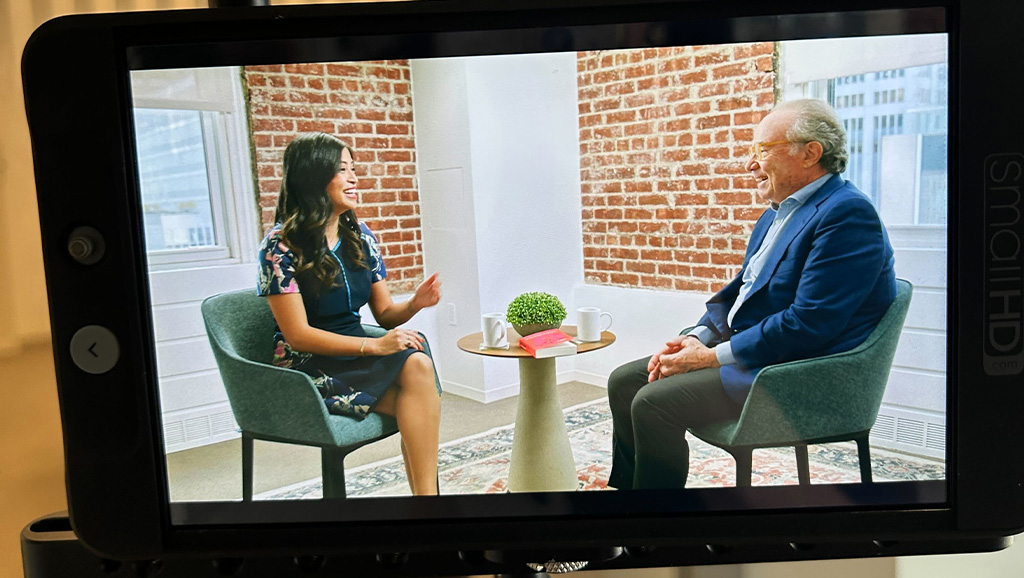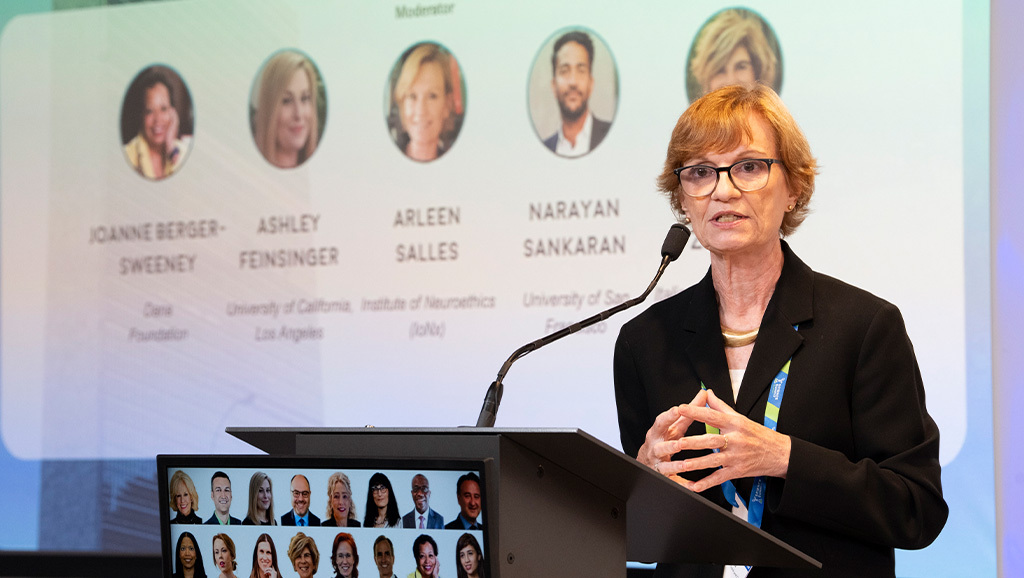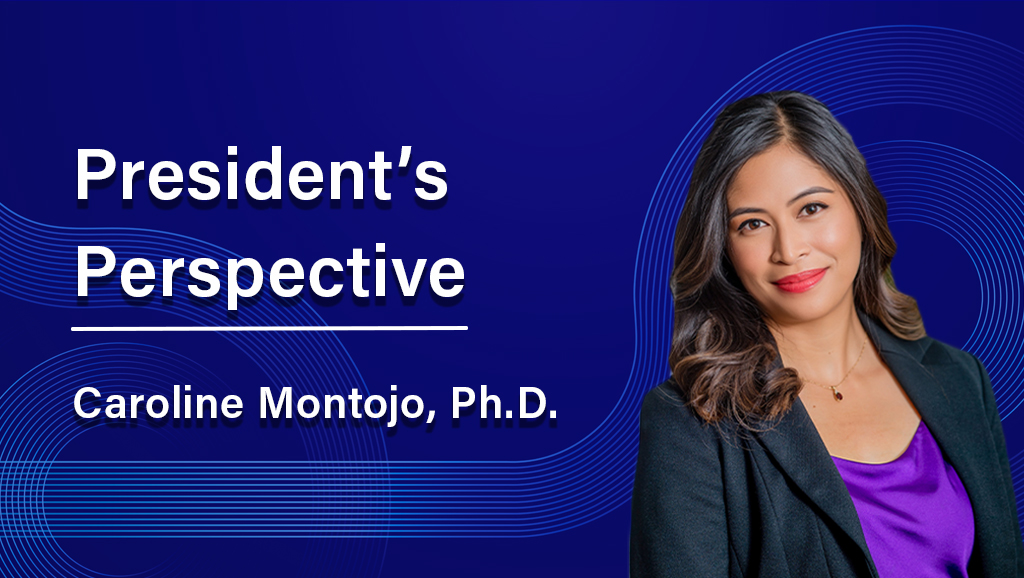News & Insights
A New Series for Neuroscience and Society Storytelling


We talk about the interdisciplinary nature of “neuroscience and society,” but what does that look like? In a new video series called, “NeuroSociety Stories,” we hope to show you. Each episode invites people to share their unique perspectives, experience, and practical advice on how to better connect brain science to societal goals and community values.
In an age when brain research and neurotechnology are progressing faster than public dialogue on their potential uses and misuses, we hope to illustrate how to invite more interdisciplinary and community perspectives into science through informal conversations in “NeuroSociety Stories.” Guided by our president, Caroline Montojo, Ph.D., viewers will hear directly from Foundation grantees, partners, and others, who have dedicated their careers to fostering neuroscience’s positive role in the world.
Our first episode features a lauded scientist and physician who has made significant contributions to neuroscience over the years. Pierre Magistretti, Ph.D., is professor emeritus of neuroscience at multiple universities in Switzerland and former president of the Swiss Society for Neuroscience (1997-1999), the Federation of European Neuroscience Societies (2002-2004), and the International Brain Research Organization (2014-2019).
Magistretti has a longstanding history with the Dana Foundation as one of the founding members and former vice chairman of the European Dana Alliance for the Brain—the European counterpart to the Dana Alliance for Brain Initiatives. These member organizations were supported by the Dana Foundation from the 1990s to 2022 and were dedicated to promoting the progress and promise of brain research to the public. This recognition that the future of neuroscience lay at the intersection of neuroscience and society laid the groundwork for Dana’s current mission, which is to advance neuroscience that benefits society and reflects the aspirations of all people.
“These organizations created a new culture in neuroscience—one where it was okay to talk to the public about your work and why it was important … We showed there is value in talking to journalists and to the lay public, taking the time to increase public understanding of neuroscience,” said Magistretti when looking back on the Dana Alliances.
Having “NeuroSociety Stories” debut with Magistretti as its first guest was a decision underpinned by the recognition that neuroscience, more than ever, needs to adopt a more inclusive and interdisciplinary approach to strengthen human well-being and flourishing everywhere. The episode emphasizes the importance of nurturing neuroscience with a variety of perspectives, including from fields such as ethics, law, and social sciences. Magistretti and Montojo challenge the traditional mindset in scientific and academic circles, advocating for a cultural shift in neuroscience that elevates other disciplines, as well as community perspectives, to better serve humanity.
We invite viewers to join Magistretti and Montojo in the setting of the Dana Foundation office in New York City, where Dana staff show up each day to help the Foundation realize its mission. There’s more to come with our second episode featuring Jayatri Das, Ph.D., who specializes in science education, so we hope you enjoy.
Watch this bonus footage and hear how ancient Greek poetry ultimately led Pierre Magistretti to pursue a career in neuroscience.
FULL TRANSCRIPT
CAROLINE MONTOJO, HOST: Welcome to “NeuroSociety Stories” from the Dana Foundation. We’re delighted to have Pierre Magistretti join us today. These sessions are an opportunity to share stories about neuroscience and society. These can come from Dana grantees, partners, and others who seek to increase neuroscience’s positive impact on society. The Dana Foundation’s vision is brain science for a better future. And we approach this vision with the recognition that all science can produce both salutary, as well as negative, effects on human well-being and flourishing; and we seek to maximize the potential of the field to do good. Our mission is to advance neuroscience that benefits society and reflects the aspirations of all people. It includes fields where neuroscience interfaces with the world beyond biology and medicine, such as ethics, law, humanities, social sciences, policy, arts, and public engagement.
Pierre Magistretti, lauded, neuroscientist and physician, is author to over 250 publications in peer-reviewed journals internationally. He is a professor emeritus at École Polytechnique Fédérale de Lausanne, University of Geneva, and University of Lausanne, and the former president of the Federation of European Neuroscience Societies and the International Brain Research Organization. Pierre is currently distinguished professor at King Abdullah University of Science and Technology. Pierre, welcome to the Dana Foundation.
PIERRE MAGISTRETTI: Thank you. It’s my pleasure to be here.
MONTOJO: Thank you for joining us. How did you come to recognize that neuroscience outreach is important, and why is it important for neuroscientists to participate in outreach and education?
MAGISTRETTI: Yes, it really came naturally, I should say. Of course, I was in my early forties then and had been focusing, I guess rather intensely, on my lab. My world, my society—outreach—was my lab, fundamentally, and I think this is fine, but I soon realized that what we do as scientists, first of all potentially has an impact on society. But even more importantly, we as scientists are, I think, accountable to society to do what we do.
MONTOJO: How would you explain what “neuroscience and society” is?
MAGISTRETTI: I think neuroscience and society is simply being a part of society. I mean, you’re a scientist. You cannot live in an ivory tower. You cannot just focus exclusively on your discipline, as we are human beings. We are fathers, mothers, we have friends, we belong to associations—Human beings are social, but also, being a neuroscientist, working on the brain with all the entails in terms of exchanges between human beings, sensory processing, motor emotions, all that makes us, what we are is based fundamentally on the brain. So, you have to be interested in what is outside your lab in all different aspects, how neuroscience can impact different fields like you mentioned in the introduction, law, humanities, arts, and other aspects. And so you have to connect, you have to be aware, be informed of what’s happening out there, so that feeds potentially even your research. And at the same time, as a neuroscientist engaged in society, you can say, well, from the brain point of view, I think we can have an opinion or advice on a specific aspect of society. So, it’s a two-way street.
MONTOJO: How do you think interdisciplinary education and training could enrich a scientist’s thinking or deepen the research impact on society?
MAGISTRETTI: Yes, I really am a very strong believer of, let’s call it, as you mentioned, interdisciplinarity. It’s a bit of a buzzword now. Everybody, everything has to be interdisciplinary. But I think there are many dimensions in “interdisciplinary.” Of course, there is one that is somehow, let’s call it, focused, or restricted to science, to neuroscience, for example. So you need studying electrophysiology, biochemistry, molecular biology, AI, now machine learning. So, you need many disciplines to try to understand behavior or processes in cells or mechanisms of diseases. But I think I know what Dana has in mind is more than that. It’s really interdisciplinary. Also opening up to, let’s call them, more humanities or aspects that are generally not immediately considered as being neuroscience.
MONTOJO: Can you share some examples of neuroscientific areas, research areas, that could be ripe for community feedback?
MAGISTRETTI: First of all, I think it’s very important, this notion of a two-way street. You cannot be in your lab and do your experiments—and that may have an impact, for example, on developing some new molecules or new even therapeutic approaches or methods of investigation—and just not care about what their impact could be on society. So, you need to have feedback. There are developments that you can ask questions that have impact on society. For example, deep brain stimulation, gene therapy, just to take two examples,
MONTOJO: What can we do to strengthen the relationship between science and society?
MAGISTRETTI: You have to listen to the public and incorporate in your communication of your research, but also maybe in the way you do your research, this feedback.
MONTOJO: What I’m hearing from you is how important it is to bring science into the social fabric of life.
MAGISTRETTI: You said it much better than I did. [Laughs] Exactly. That’s the exact term. The social fabric of life. Exactly.
Recommended Reading

From Broadcast to Belonging: Dana's Public Engagement Evolution

Reciprocity in Neuroscience: Dana Foundation Panel at the UN Science Summit
